-
 Bitcoin
Bitcoin $115100
1.27% -
 Ethereum
Ethereum $3675
2.71% -
 XRP
XRP $2.995
1.45% -
 Tether USDt
Tether USDt $1.000
0.02% -
 BNB
BNB $769.8
2.64% -
 Solana
Solana $168.0
3.25% -
 USDC
USDC $0.9999
-0.01% -
 TRON
TRON $0.3371
1.48% -
 Dogecoin
Dogecoin $0.2051
3.36% -
 Cardano
Cardano $0.7394
2.30% -
 Hyperliquid
Hyperliquid $38.15
0.42% -
 Stellar
Stellar $0.3966
-0.36% -
 Sui
Sui $3.486
2.93% -
 Chainlink
Chainlink $16.72
2.52% -
 Bitcoin Cash
Bitcoin Cash $568.0
4.36% -
 Hedera
Hedera $0.2440
2.59% -
 Ethena USDe
Ethena USDe $1.001
0.04% -
 Avalanche
Avalanche $22.16
2.06% -
 Litecoin
Litecoin $119.1
-0.73% -
 UNUS SED LEO
UNUS SED LEO $8.991
0.04% -
 Toncoin
Toncoin $3.232
-0.39% -
 Shiba Inu
Shiba Inu $0.00001233
2.82% -
 Uniswap
Uniswap $9.717
2.53% -
 Polkadot
Polkadot $3.664
1.85% -
 Dai
Dai $1.000
0.01% -
 Monero
Monero $281.2
-3.89% -
 Bitget Token
Bitget Token $4.350
1.55% -
 Cronos
Cronos $0.1428
5.07% -
 Pepe
Pepe $0.00001050
3.68% -
 Aave
Aave $262.3
3.54%
Is it legal to buy USDT with a blocked bank card?
Buying USDT with a blocked credit card can have serious legal consequences, including criminal charges and asset seizure if the card has been stolen or frozen due to fraud.
Feb 01, 2025 at 01:36 am
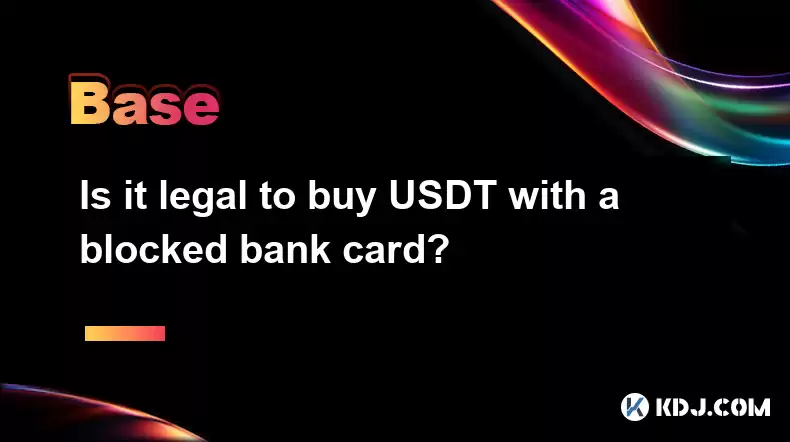
Is It Legal to Buy USDT With a Blocked Bank Card?
Key Points:
- Understand the legality of using blocked bank cards for cryptocurrency purchases
- Explore potential risks and consequences associated with such transactions
- Examine alternative payment methods available for USDT acquisition
Legality of Using Blocked Bank Cards
The legality of purchasing USDT with a blocked bank card varies depending on the specific jurisdiction and the underlying reasons for the card's blockage.
Unauthorized Card:
- Using a stolen or unauthorized bank card to buy USDT is a criminal offense.
- It falls under the category of fraud and may result in legal consequences, including fines, imprisonment, or asset seizure.
Frozen account:
- If a bank account linked to the card is frozen due to suspected fraud, suspicious activity, or a court order, using the associated card to purchase USDT is likely illegal.
- Attempting transactions with a frozen account can further jeopardize the financial situation.
Card Blockage Due to Technical Issues:
- In some cases, bank cards may be blocked temporarily due to technical glitches or fraud prevention measures.
- Using a blocked card for USDT purchases during these periods may not be illegal, but it is advisable to contact the bank and resolve the issue before initiating transactions.
Potential Risks and Consequences
Engaging in USDT purchases with a blocked bank card poses several potential risks:
Account Closure:
- Banks may terminate the blocked account and/or close related accounts associated with the card.
Asset Seizure:
- If the underlying reason for the card blockage is related to criminal activity or fraud, law enforcement may seize the USDT purchased illegally.
Investigation and Prosecution:
- Using a blocked card for USDT purchases can trigger investigations by the bank, law enforcement, or financial regulators.
- This may lead to criminal charges and related penalties.
Alternative Payment Methods for USDT Acquisition
If a bank card is blocked, alternative payment methods can be explored to acquire USDT:
Peer-to-Peer (P2P) Exchanges:
- Online marketplaces connect buyers and sellers directly, allowing for USDT purchases using various payment options like mobile wallets, cash, or gift cards.
Crypto Exchanges:
- Centralized and decentralized exchanges provide platforms for trading USDT with a wide range of cryptocurrencies and fiat currencies. They may support direct bank transfers or alternative payment options like credit/debit cards and mobile payments.
Over-the-Counter (OTC) Trading:
- Private and discreet transactions can be arranged through OTC desks specializing in large-volume USDT trades. They often offer flexible payment methods, including wire transfers, bank drafts, or cash settlements.
FAQs
Q: Can I buy USDT anonymously with a blocked bank card?
A: Using a blocked bank card for anonymous USDT purchases is highly unlikely. Banks typically require identity verification for card issuance and may investigate any suspicious transactions.
Q: Is it possible to use a third-party service to bypass bank card blockage?
A: It is not recommended to use third-party services that claim to bypass card blockages. Such services may be fraudulent or expose personal and financial information to risks.
Q: What happens if I successfully buy USDT with a blocked bank card?
A: If the underlying reason for the card blockage is discovered, the bank may reverse the transaction, seize the USDT, and potentially pursue legal action.
Disclaimer:info@kdj.com
The information provided is not trading advice. kdj.com does not assume any responsibility for any investments made based on the information provided in this article. Cryptocurrencies are highly volatile and it is highly recommended that you invest with caution after thorough research!
If you believe that the content used on this website infringes your copyright, please contact us immediately (info@kdj.com) and we will delete it promptly.
- Fireverse Token: Igniting a Musical Revolution in Web3
- 2025-08-07 08:27:45
- Ethereum, L2 Withdrawals, and Decentralization: A New Yorker's Take
- 2025-08-07 08:32:33
- Avalanche vs. Ruvi AI: Daily Sales Tell a Story of Crypto Disruption
- 2025-08-07 06:29:35
- DeSoc: The Crypto to Buy Now for a Decentralized Future (and Maybe 43x Gains!)
- 2025-08-07 06:50:16
- Arctic Pablo Coin: Riding the Meme Coin Wave with a Deflationary Twist
- 2025-08-07 07:18:13
- XRP Price Skyrocket? Decoding the Cryptocurrency's Next Move
- 2025-08-07 07:31:50
Related knowledge
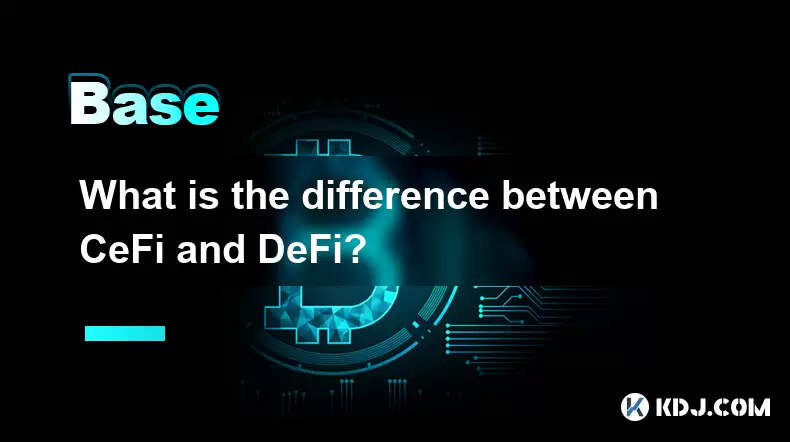
What is the difference between CeFi and DeFi?
Jul 22,2025 at 12:28am
Understanding CeFi and DeFiIn the world of cryptocurrency, CeFi (Centralized Finance) and DeFi (Decentralized Finance) represent two distinct financia...
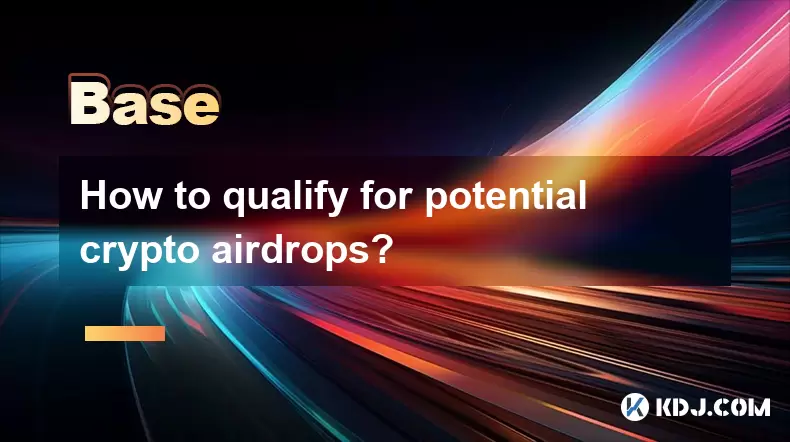
How to qualify for potential crypto airdrops?
Jul 23,2025 at 06:49am
Understanding What Crypto Airdrops AreCrypto airdrops refer to the distribution of free tokens or coins to a large number of wallet addresses, often u...
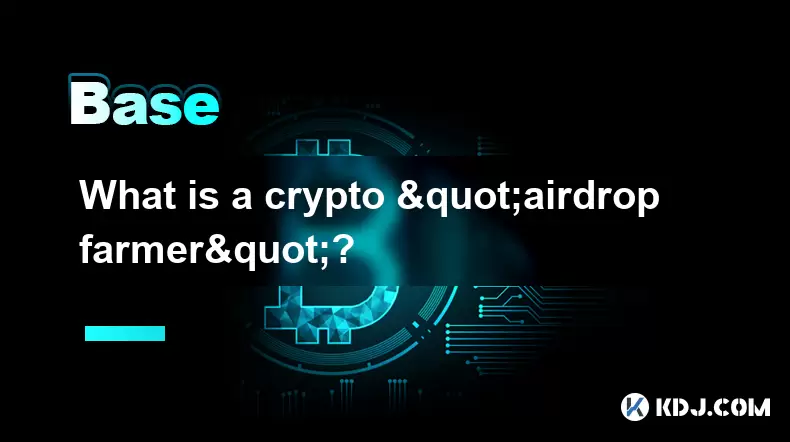
What is a crypto "airdrop farmer"?
Jul 24,2025 at 10:22pm
Understanding the Role of a Crypto 'Airdrop Farmer'A crypto 'airdrop farmer' refers to an individual who actively participates in cryptocurrency airdr...
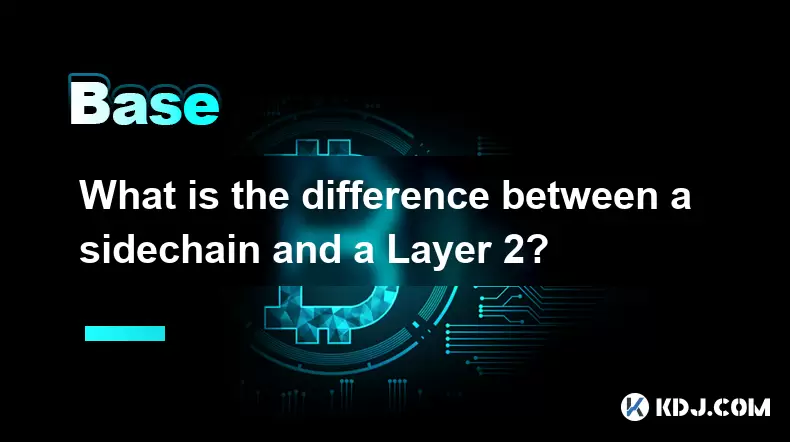
What is the difference between a sidechain and a Layer 2?
Jul 20,2025 at 11:35pm
Understanding the Concept of SidechainsA sidechain is a separate blockchain that runs parallel to the main blockchain, typically the mainnet of a cryp...
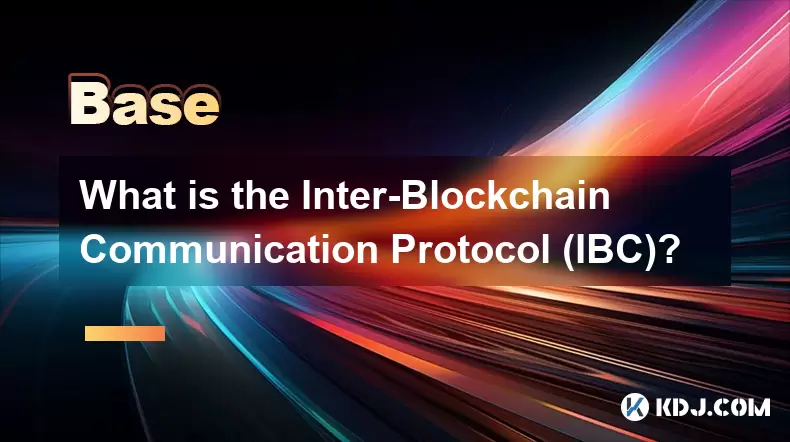
What is the Inter-Blockchain Communication Protocol (IBC)?
Jul 19,2025 at 10:43am
Understanding the Inter-Blockchain Communication Protocol (IBC)The Inter-Blockchain Communication Protocol (IBC) is a cross-chain communication protoc...
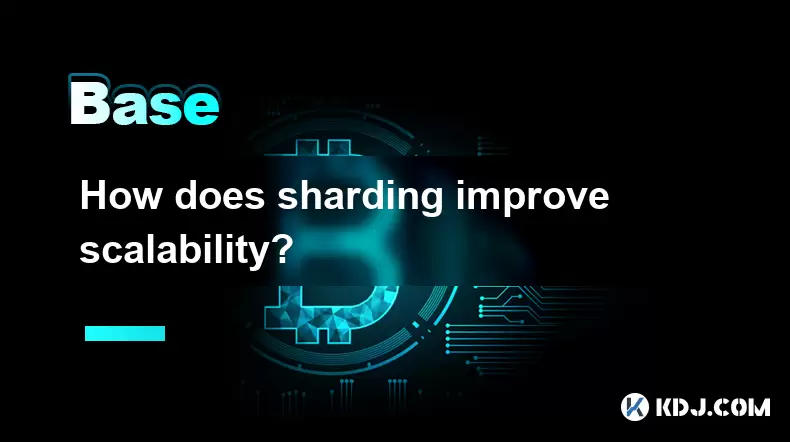
How does sharding improve scalability?
Jul 20,2025 at 01:21am
Understanding Sharding in BlockchainSharding is a database partitioning technique that is increasingly being adopted in blockchain technology to enhan...

What is the difference between CeFi and DeFi?
Jul 22,2025 at 12:28am
Understanding CeFi and DeFiIn the world of cryptocurrency, CeFi (Centralized Finance) and DeFi (Decentralized Finance) represent two distinct financia...

How to qualify for potential crypto airdrops?
Jul 23,2025 at 06:49am
Understanding What Crypto Airdrops AreCrypto airdrops refer to the distribution of free tokens or coins to a large number of wallet addresses, often u...

What is a crypto "airdrop farmer"?
Jul 24,2025 at 10:22pm
Understanding the Role of a Crypto 'Airdrop Farmer'A crypto 'airdrop farmer' refers to an individual who actively participates in cryptocurrency airdr...

What is the difference between a sidechain and a Layer 2?
Jul 20,2025 at 11:35pm
Understanding the Concept of SidechainsA sidechain is a separate blockchain that runs parallel to the main blockchain, typically the mainnet of a cryp...

What is the Inter-Blockchain Communication Protocol (IBC)?
Jul 19,2025 at 10:43am
Understanding the Inter-Blockchain Communication Protocol (IBC)The Inter-Blockchain Communication Protocol (IBC) is a cross-chain communication protoc...

How does sharding improve scalability?
Jul 20,2025 at 01:21am
Understanding Sharding in BlockchainSharding is a database partitioning technique that is increasingly being adopted in blockchain technology to enhan...
See all articles

























































































